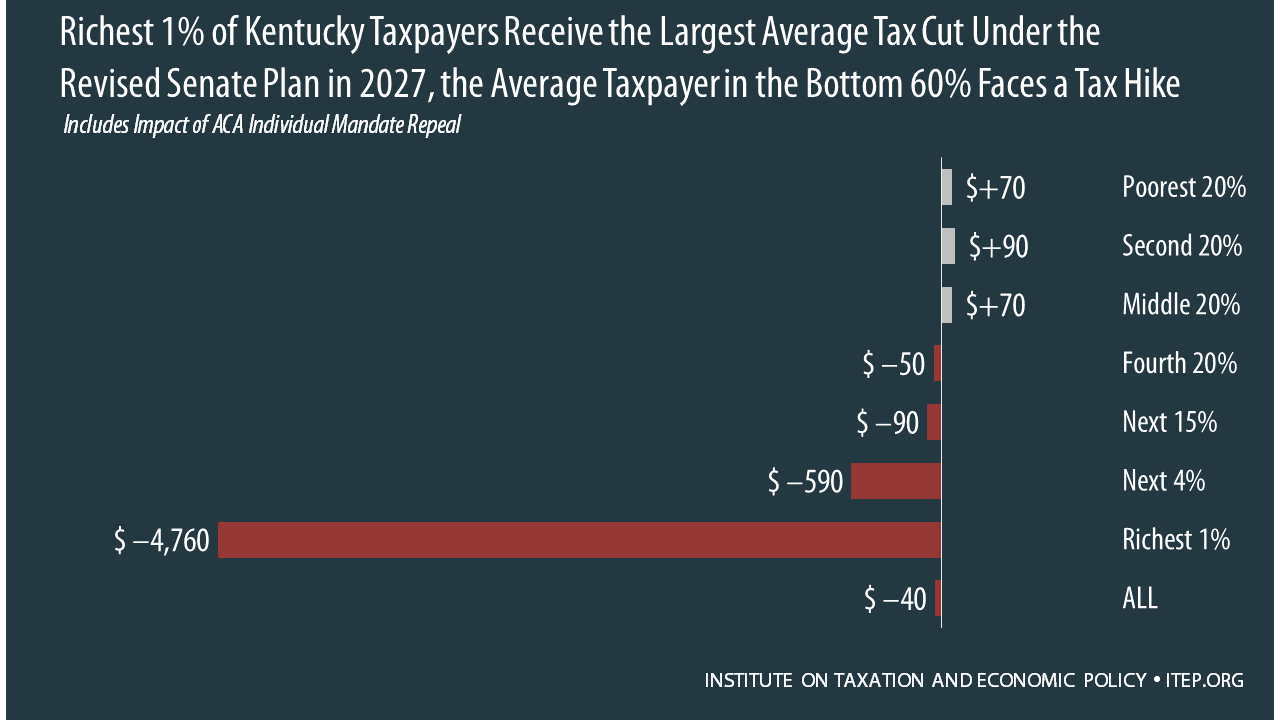Like the top-heavy tax cut plan passed in the House last week, the plan now in front of the Senate would shift taxes away from millionaires and corporations and over to low- and middle income Kentuckians while setting the stage for deep cuts to the budgetary programs and services that help Kentucky’s communities thrive.
Senate Plan Slashes Taxes at the Top, Increases Taxes for Low and Middle-Income Kentuckians
Senators will return to Capitol Hill next week after the Thanksgiving recess for a potential vote on their revised plan. According to estimates from the Institute on Taxation and Economic Policy (ITEP), the bottom 60 percent of Kentuckians, who make an average of $37,500 a year, will actually face more taxes from the plan with an average increase of $80 in 2027. High earners, in contrast, would receive tax cuts — especially the wealthiest, with the richest 1 percent receiving an average cut of $4,760. The top 1 percent of Kentuckians based on income will take home 24 percent of the total tax cut in 2019.
Plan Pays for Tax Breaks for Ultra-Wealthy by Hurting Most Everyone Else
A big reason the plan is so top-heavy is that it goes to great lengths to permanently cut the top corporate income tax (CIT) rate from 35 to 20 percent, the benefits of which would flow primarily to the wealthiest domestic and foreign owners of corporate stocks. The plan also temporarily deeply cuts the estate tax, eliminates the alternative minimum tax for high-income earners and cuts taxes for corporations organized as pass-through entities.
Recent changes by the Senate Finance Committee pay for the tax cuts including by:
- Repealing the ACA’s individual mandate. This measure would leave 13 million fewer Americans insured, destabilize the individual market and raise premiums by an estimated 10 percent for millions more. Passing the Alexander-Murray bill, as some have expressed interest in doing and which attempts to stabilize the market, would not undo the damage of an individual mandate repeal. The savings to the federal government from reducing the number of people with health care would cover about a third of the cost of the reduction in the corporate rate.
- Permanently changing the way income tax provisions like the standard deduction and tax brackets are inflated (which is done to preserve their value over time). By opting for a slower-growing inflator, the “chained CPI,” the value of these provisions will erode and more of Kentuckians’ income will be taxed.
- Ending or “sunsetting” other individual income changes made in the plan in 2025 such as the doubled standard deduction, repeal of personal exemptions and Child Tax Credit expansion that leaves 43 percent of children in working Kentucky families behind. By themselves, these provisions and their sunsets create winners and losers out of Kentucky families. Combined with the slower inflator and individual mandate repeal among other changes, the plan will leave the bottom 60 percent of Kentucky families worse off in 2027.
Even with these big “pay-fors,” the Senate plan would still substantially increase the federal deficit, potentially forcing spending cuts to essential investments in Kentucky families and communities through Medicare, Social Services, and student loans as early as next year. The President and members of Congress are already saying the next step in their plan is to make cuts to safety net programs like Supplemental Nutritional Assistance Program (SNAP, formerly food stamps) and Medicaid. And discretionary spending on low-income housing assistance, education, community development, child care and many other important programs is in danger of further spending cuts on top of those under the budget Control Act of 2011 and sequestration. In other words, the plan’s forced spending cuts would hurt all Kentuckians and our communities, but especially the most vulnerable.
From the individual components to the overall impact, the Senate’s tax plan is clearly designed to provide a huge tax break for those at the top. The House’s passed plan is no better, meaning that if the Senate passes their bill and the chambers go to conference, the potential consequences to the commonwealth and the entire U.S. are difficult to overstate.




